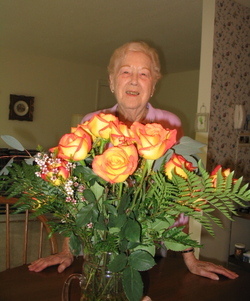 Shloshim is the number 30 in Hebrew, and this past Tuesday morning, immediately following Shacharit, the morning prayers, marked 30 days since my mother Elsie's burial. I have been going to synagogue daily to davven and to say Kaddish for her. When the moment arrives to stand and remember, the service leader asks everyone to share the name of the person whom s/he is saying Kaddish for. I say, "My mother, Elsie Novak, Osnat bat Moshe Bayer haCohen v'Nachuma." The mourners and those observing yahrtzeit proceed to say the words together, the text of the Jewish mantra which dating back to the 1st C BCE, words which serve to sanctify all life, as we gently guide the soul of our loved ones back to their source. While saying Kaddish last night I began to cry. The tears came not from immediacy of my mother's death, that has subsided with time, but rather from a fear that after only 30 days the recitation of the Kaddish was already feeling somewhat rote, routine, and G!d forbid, mundane. I don't want my remembering to become distracted habit, I want it to stay fresh and vibrant and heart-opening. How had 30 days had passed so quickly? The truth of that saddened me. The text of the Kaddish is engraved in me. I do not need to read it from the siddur. יהא שמה רבא מברך... With my hands free my mind began to wander. I heard the echo of a word that my mother used to use: PLICHING When it was raining very, very hard, my mother would say that "it's pliching out." I never had had any impulse to research the origin of the word, but during shiva, when many things have time to surface, I took the opportunity to pick up my English-Yiddish dictionary, and sure enough, there it was: פליוכרעגן (someone please help me with the pronunciation here). I smiled, and acknowledged that it had taken me all of my life to look up the word that my mother used so often. Why had it taken until now? More tears welled up. The Kaddish continued, לעלא מן כל ברכתא ושירתא Another word arose in my consciousness, KAMMONDAVING. My mom used this word to mean making a racket, or commotion, as in "Who needs all that kammondaving around the house." I was less successful finding any origin of this word in the dictionary. Perhaps my mother had made it up? The sense of the word did play a role before shiva started. I had decided that although I would let my various communities know of my loss, I was not going to advertise the times that we would be sitting shiva. I don't like the vibe after prayer, which more often than not turns into a loud social gathering as opposed to being in a house of mourning. I questioned my decision not to make the times public, but at one point realized, "That's my mother! She wouldn't have liked all the kammondaving in the house." Another way that my mother lives on through me. I have 10 months left to say Kaddish for my mom. The ritual will take me through the winter, spring, summer, and fall; through the entire year's cycle of holidays; through planting and tending and reaping and finally again laying to rest my beloved garden; through watching the budding of our lilac tree, until it flowers, when I will bend a branch to my nose, a havdalah moment, and I will gather in my mother's favorite fragrance. I will then say out loud, "Hello Mamale"; through another baseball season where every batter's intention is to circle the bases and return home. עשה שלום במרומיו הוא יעשה שלום... I wipe the tears from my eyes, and a sense of peace comes over me. Death, burial, shiva, shloshim; minyan, kaddish, breathe. אמן Amen  Minyan Oneg Shabbat has been offered a Matching Grant up to $1500. As of 12/11 only $418 more to raise by 12/31! Please consider offering a tax deductible donation of $18 or more to support this project and the work of DC's Jewish Renewal community Minyan Oneg Shabbat. All proceeds go to providing us with rental space and the ability to dream a little bigger.
1 Comment
First Base
Setting: The stage is in complete darkness. A pinspot shines center stage. Voice #1 (an ethereal voice from emanates all corners of the theater): Are you proud to be a Jew? Voice #2 (from darkened stage): Yes Voice #1: Did you become Bar Mitzvah? Voice #2: No Voice #1: Do you celebrate the holy days? Voice #2: No. Voice #1: The what are you so proud of? Voice #2: That I am a role model for young Jewish kids. Voice #1: But you are a cheater and an unapologetic wrongdoer. Voice #2: Voice #1: You need to ask for forgiveness. Voice #2: I've already done that. Voice #1: Yes, but you have to really mean it. Voice #2: I am genuinely sorry for what I have done. (pause) How's that? Voice #1: Works for me. But what you have done needs asking for forgiveness from those you have hurt. This is not a sin Beyn Adam v'Makom, but rather Beyn Adam V'chavero. Voice #2: Voice #1: Sorry, I should have known that you wouldn't get that reference... you need to do teshuva. Voice #2: What do I need to do to a shoe? Voice #1: T'-shu-va...you need to apologize to the people you have hurt, not me. And it's the perfect time of year to do teshuva. Voice #2: Perfect time of year? You're right about that! Pennant races, the playoffs... Voice #1: Oy, I need this like a loch en cup. Listen my friend, this is taking much more of my precious time then I had planned, which is pretty impressive, since to me a second is like a hundred million years. (He laughs) Voice #2: What the...? Voice #1: (as an aside) Gevalt, he doesn't even know our jokes! Here's what I suggest - you'll talk to a rabbi. I'll set up a meeting with you and one of the greatest rabbis who ever lived, The Rambam. Why didn't I think of that before? Mr. Braun, go and learn. As for me, I'm going to vacate this space and do some tzimtzum. Voice #2: Tzim...tzim...Tzimmes! I know what THAT is! Voice #1: (as an aside) Maybe there's hope for this child yet. Second Base Setting: Rambam's study - Two chairs are set facing each other, angled towards the audience Rambam: What is your Hebrew name young man? RanBran: Uh, I don't know sir. Rambam: You don't know or you don't have one. RanBran: I don't think that I have one. I don't know. Rambam: OK, then we'll give you one when the time is right. Now, tell me why you have you come to see me? You have a reputation for being powerful, but travelling 900 years into the past is pretty impressive by any standards. OK, let's get started, I only get 3 hours of sleep a night, and my time is precious. RanBran: I was told that I need to shoe something? Rambam: Teshuva. RanBran: Yeah, that's it, teshuva.....what's teshuva? Rambam: Hmmm... Hillel might have been able to distill it down to 140 characters, but I'm going to have to give you a longer version. RanBran: I have nothing but time, 65 games worth. Rambam: What was your sin? RanBran: I got nailed for taking PEDs. (Rambam looks at him quizically) Performance Enhancing Drugs - PED's are a banned substance in my profession. Rambam: You're a gigolo? RanBran: (shocked) No! A baseball player, and a pretty good one too. Have you ever heard of baseball? Haven't you ever heard of me? Rambam: Baseball? Of course, for the Torah says "in the big inning.." (He winks) RanBran: Huh? Rambam: Gevalt, he doesn't even know our jokes. Voice #1: I know, I know. (Rambam nods in agreement) Rambam: And truth be told, I've never heard of you, because only the Holy One of Blessing can look into the future. Let's get to why you're here. You want to, or, anyway, you need to do teshuva, correct. RanBran: I suppose so... Rambam: Here are some ways to do it. First, you could change your name. RanBran: What? Change my name, to what? Rambam: To anything other than the one you use now. RanBran: And how does that work exactly? Rambam: It's as if to say "I am another, and I am not the same person who did those deeds." RanBran: (excited) That could work. (to self) Imagine, two busts of me in the Hall of Fame. Rambam: Well, maybe not then. This is really about the supression of ego and I might need to send you to Freud to deal with that. There is something else you could try. You could exile yourself from your place. RanBran: You mean get traded? I'm not the GM, and I like Milwaukee. Rambam: Changing places would humble you. Like we find in the Talmud, "if a person finds that an evil urge is overpowering him, he should go to a place where they don't recognize him, wear dark clothing, and wrap himself in black. RanBran: (looking dejected) I already feel like an outcast. Rambam: OK, let me suggest one more possibility. How about giving tzedakah? (RanBran looks puzzled) Charity. Giving charity would avert the severity of the decree. RanBran: You mean they might reduce the number of games I have to sit out if I give some money to charity? How much would I have to give? I lost 40% of my salary. Rambam: How much do you make RanBran: 10 million dollars a year. Rambam: (long silence)...........Mr. Braun, do you acknowledge your sin? RanBran: Yes. Rambam: Do you regret doing it? RanBran: Yes. Rambam: Do you resolve never to do it again, even if the opportunity presents itself? RanBran: Yes. Rambam: Finally, have you asked from forgiveness from those you have hurt? RanBran: Well, not exactly.... Rambam: Go do it! Third Base Setting: The RanBran's home office - The RanBran is dialing a cell phone. RanBran: Hello , I 'm trying to reach Wes Aldridge. Aldridge: This is Wes Aldridge. Who is this? RanBran: Mr Aldridge, this is Ryan Braun. I am calling all the Brewer season ticket holders to apologize and ask for your forgiveness. Aldridge: (pauses) C'mon, who is this really? RanBran: It's Ryan Braun Mr. Aldridge, and I'd like you to ask that you consider forgiving me for my actions. I am really very sorry. Aldridge: Well, if it's really you, then I must tell you Mr. Braun, that I can't do that. You cheated the game. In fact, I've packed up your memorabilia and intend to keep all of it out of the sight of my grandsons. RanBran: I'm sorry you feel that way. Mr. Aldridge, would you mind if I called you back sometime to see if you changed your mind? Aldridge: Do what you want. RanBran: Thank you for your time, I appreciate you giving me the opportunity to atone for my mistake. (He snaps his cell phone closed) Yes! Now I only have to call him back two more times and I'm home free!* Rambam and Voice #1: That he knows about??? (RanBran winks to audience) (Lights to black) * According to Jewish law, once you sincerely ask for forgiveness three times you no longer carry the burden. 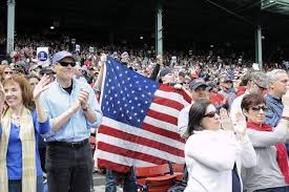 I go to shul to pray in community nearly every Shabbat. I go to Nats Stadium to watch and root in community a number of times a year. And I read the sports section of the Washington Post nearly every day. After the Boston bombing I started thinking about the idea of community and what it means to be a part of one. And then sportswriter Tracee Hamilton wrote about that very subject. I read her paper - she must have been reading my mind. The article pointed out just how vulnerable spectators are at sporting events, and that perhaps one day soon, partly because of security concerns. people may choose to stay home. That would be a great loss she notes, because being a member of a sports community is all that some people have. Where would that choice leave many? Plugged into personal communication devices that estrange us from a sense of community. (Maybe some day someone will invent the wePad) Interestingly, a reader wrote to the Post objecting to Hamilton’s premise about loss of community. “Isn’t the online community a community?” he asked. I am not going to comment on that, but rather look to last week’s Torah portion for guidance, where at the beginning of Parshat Kadoshim G!d says “You shall be holy”. The word “you” is stated in the plural, and the declaration is meant to be addressed by Moshe to "adat Yisrael", the entirety of the congregation of Israel. The Chatam Sofer comments that this holiness refers to holiness that can only be attained in community, holiness that springs forth from relationship with one’s neighbor. (“v’ahavta, rey’echa kamocha” - love your neighbor as yourself - appears a few lines later) The Chatam Sofer is teaching that we should seek G!d in community, that isolating oneself in the search for holiness is not the ideal. I suspect that the Rebbe never once went to a ballgame. 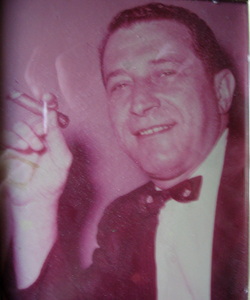 I have memory of my father, Abraham Novak (z"l) , chanting. making his way through the haggadah at stunning speed, interrupted occasionally by my mother peeking out of the kitchen, asking "how much longer until dinner?" I have memory of my father singing, always a Jewish liturgical song, in his rich deep bass, a voice that held up the world. I have memory of my father working, standing over the cutting table at his dress factory, cigar in hand, ruling his small "empire" that employed 20 people for 40 years. I have memory of my father smoking his cigar, his constant companion every day, except on Shabbas. My mother would ask, "Adolph, why can't every day be Shabbas?" I have memory of me and my father playing catch on the side of our house. He is wearing a white tee shirt, shorts, black socks and shoes, tossing a hard ball with me, back and forth, as time stands still. Is this heaven? (Yes, I do weep, every time, at the end of Field of Dreams) I have memory of my father eating, always with a yarmulke on his head. He expected me and my brother to always wear one at the table as well. I remember one day as a teenager sitting down at the table, beggining to eat purposely without my head covered. I hear my father say to my mother, "Tell your son that at my table we wear a yarmulke." I have no memory of my father crying. I have memory of my father selling cans upon cans of maccaroons to everyone he possibly could - in his workplace, on the subway, in the neighborhood. With his help I win the #1 prize in the religious school contest for selling maccaroons - a radio that clips on to my bicycle handle. I have memory of my father lying in bed at the hospital. Although he cannot open his eyes nor utter a word, he hears me singing to him, L'dor Va'dor, and instinctively, through labored breathing, he reaches for the harmony part. For all that you gifted me with dad, I thank you. When I say Kaddish for you, through the gift of memory you are reborn, allowing me, once again, to feel your presence. I never died said he. 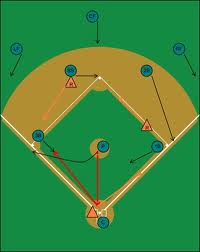 Yesterday I asked Ben, my bar mitzvah student and fellow baseball lover, how he would define the word "sacrifice". He replied that "it is when you give something up fo yourself in order to benefit others or yourself." I was struck by his insight, and was delighted to happen upon the image to the left of what happens on a baseball field when a batter sacrifices himself for the benefit of the team. Notice that his intention/action sets every other player on the field in motion. Not one player on the field is unmoved by the action of a single member of its community. The ripple affect caused by an act of giving. 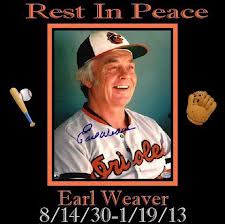 I was listening to Tony Kornheiser this morning (which I only do if I I happen to be in the car and he's talking to Bob Ryan of the Boston Globe) and Ryan shared that he learned more about baseball from former Baltimore Oriole manager Earl Weaver than any other person in his life. (Ryan had been the beat reporter for the Orioles when Weaver was manager) One day outfielder Pat Kelley walked into Weaver's office and told him that he had decided to become a minister. "I've decided to walk with God," he told his manager. Weaver replied, "Better you should walk with the bases loaded." There's such an amazing payoff being a life long baseball fan and being familiar with the characters who seem to have stepped out of a Damon Runyan story. This too is Torah. |
Mark Novak is a "free-range" rabbi who lives in Washington DC and works, well, just about everywhere. In 2012 he founded Minyan Oneg Shabbat, home to MOSH (Minyan Oneg Shabbat), MindfulMOSH (Jewish mindfulness gathering), and Archives
June 2017
Categories
All
|

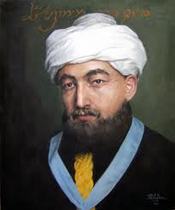
 RSS Feed
RSS Feed
